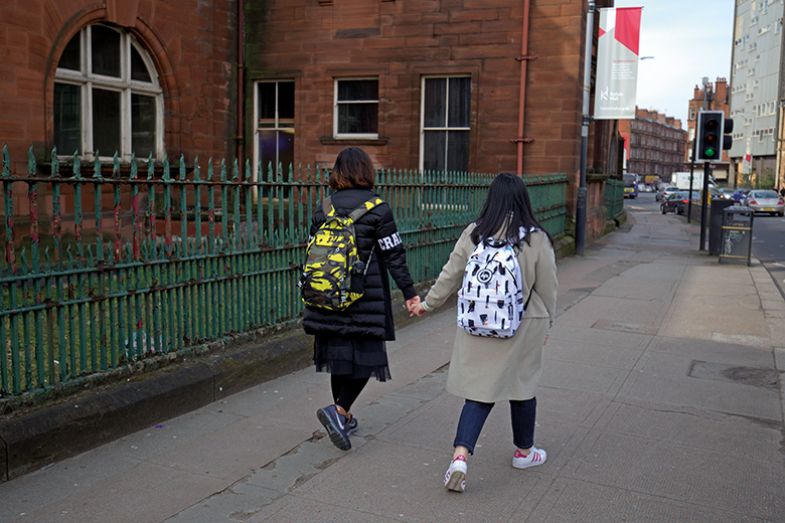More and more Chinese students are taking up degrees at Western universities. Applications from Chinese students are up 30 per cent this year, and China is already by far the largest source of international students from outside the European Union, outnumbering the next five countries combined.
But there are tensions in the air. Among them are recent cheating accusations directed against international students in general and Chinese students in particular. In January, for example, there was the notorious email from the University of Liverpool international advice and guidance team about exam conduct, which translated the word “cheating” into Chinese but no other foreign language, on the grounds that Chinese students were “usually unfamiliar with the word” in English. A student petition condemned the email as “racially discriminative”.
There have been incidents elsewhere as well, whispered about or retweeted on Chinese social media platforms; in the US, a professor at the University of Maryland, College Park recently resigned as a result of one such case, in which he allegedly claimed that “all Chinese students cheated their way into [the] United States”.
As an anthropologist specialising in the study of China, I have also heard anecdotes about cheating incidents from friends and colleagues. One master’s student from Shanghai was outraged to learn that a fellow Chinese graduate student at her prestigious UK university gained his place by falsely claiming to have a BA from a top university in China. Once accepted, the student could not cope with the course requirements and apparently commissioned his professor’s research assistant to write most of his master’s thesis – with the professor’s knowledge. (The professor and the research assistant were both British.)
And two Chinese students at different universities in the UK told me about peers who paid for exam essays ahead of finals, memorised the answers then transcribed them during the exams – a form of deception that does not so much avoid hard work as replace one type with another.
Yet cheating masks another, more insidious, problem: the disaffection of Chinese students who lack the resources they need to thrive at Western universities. As long as universities continue to ignore this problem, they are tacitly pushing students to fake their way through. A minority will take the bait. The majority will simply give up, treating their time in the West as an extended holiday, disillusioned with what they had hoped to achieve.

When they arrive in the UK, many Chinese students experience a shocking switch to different forms of assessment. Classroom norms look nothing like what they are used to. Yun Yu, a research fellow in the Faculty of Education at East China Normal University, described the experiences of Chinese students in her PhD at the University of Glasgow. “Many find that it’s very hard to get used to the educational system,” she told me. “The curriculum, pedagogy, what kind of essays your tutor would like: nobody seems to know. Students sometimes feel desperate and disappointed.”
April Liu, an associate lecturer in management at the University of Lincoln, also studies the experiences of Chinese students in the UK. “They say there’s one thing that’s confusing: writing about their opinion,” she says. Students in China are generally expected to demonstrate an understanding of what they are taught, rather than developing a perspective that might contradict their professors. “If they accept the challenge,” says Liu, “it eventually has a positive effect on their motivation.” But it can be hard to overcome ingrained habits of academic thought.
Susan D. Blum, a professor of anthropology at the University of Notre Dame, has studied both China and, separately, learning and plagiarism at US universities. She locates the problem for Chinese students in the “hidden curriculum”, the unspoken expectations that structure the academic experience. Like first-generation and minority students in the US, international students often lack this coded knowledge about what to wear to events, where to go with their problems, or how to manage social interactions with professors, which would allow them to gain a sense of mastery over their new environment.
Language is certainly a problem for some Chinese students. There can be a painful gap between the level of fluency needed to meet entrance requirements and the extensive grasp of regional accents and colourful colloquialisms needed to understand a British lecturer’s way of speaking. Universities typically require an IELTS level 5 or 6 for international students, where most domestic students would achieve a 9. Lacking the confidence to express themselves in English, Chinese students can become trapped in a vicious cycle of isolation and silence.
“Some students feel they practised their English more in China than in the UK,” says Yu. Their language difficulties have “a very negative influence on their cultural knowledge”, tarnishing their classroom experiences and their attempts at social interaction. As a result, some feel it is easier to “just stay at home” or to make friends with only other Chinese students.
Several UK universities have responded by setting up additional language classes or training in academic skills. International students are sometimes even required to take a foundation year. These additional offerings can go some way to addressing the problem. However, Liu points out, “students who really desperately need help…wouldn’t go to a language course or centre where they’re going to teach you English in English”. Moreover, academic services in many universities are already stretched to the limit. And for Chinese students who already speak and write English at a high level, mandatory foundation courses are just an expensive waste of time.

On a deeper level, there is the question of Chinese international students’ motivation – and why they are at university in the first place. Liu interviewed a student who started out full of enthusiasm, planning to open a business with his girlfriend after graduation. However, his parents did not approve of the girlfriend, whose family was not as well off. Eventually, they broke up. After that, says Liu, “he was disengaged and depressed”. Unable to motivate himself to do the coursework, he paid someone to write his thesis.
A lack of intrinsic motivation is typical among students from any background who engage in contract cheating and plagiarism, says Blum. Moreover, the economics of higher education “work against the kinds of small-scale intimate learning environments that would foster intrinsic motivation. Almost everything we say about higher education concerns extrinsic motives, so it’s hard to fault individuals for thinking that way, too.” And while it is possible to foster intrinsic motivation, “it takes training and commitment”.
Anthropologists and sociologists have written extensively about parental relationships in China, steered by Confucian ideals of filial piety. Students from mainland China report feeling tremendous parental pressure, not just to succeed but to follow a path that has been laid out for them in advance, says Liu. “If you ask them what they would like to achieve, they would all talk about what their parents said. In some cases, their job has been decided by their parents beforehand, and their parents choose an appropriate subject [as preparation for that job].”
Wei, a student from Wuhan who did his undergraduate degree in London, told me: “My parents wanted me to do accounting and finance, and I wanted to study history. My dad simply said: ‘You can’t use my money to do whatever you want.’ I had a crying mother and an angry father. So in the end, I did study finance for my undergraduate degree.” Struggling through a “boring” degree course, he nearly dropped out of his BA. Yet his parents insisted that he continue on to a master’s. He got through by the skin of his teeth.
Success for these students is not a matter of personal development. It is about getting grades and satisfying their parents, who have invested their life’s work in them. “They can’t fail,” says Blum. “If they’re an only child, which most of them are, they absolutely have to succeed. And they can’t risk their visas. So in some sense, the students [who do cheat] are behaving rationally in a system with multiple converging incentives.” Yet many, like Wei (not his real name), persist in doing the work themselves, with scant support.

It is not that there is no support available. Universities are keen to point out that their mental health services and academic support systems are available to all students, including international ones. Yet finding the right support can feel like an impossible task when you are already struggling.
Midway through her PhD in Glasgow, for instance, Yu was attacked by a stranger in the street. “He was drunk and half naked. I was barely hurt, but I was very frightened. It was a terrible experience, and in that moment I just wanted to give up my PhD and go back home.”
In China, students would typically go to their professors at times of such personal crisis. “There’s a Chinese saying that if you’re a teacher for a day, you’re like someone’s mother or father for life,” Liu says. But in the UK, there are different expectations and boundaries guiding academic relationships.
Wei, feeling isolated and depressed during his bachelor’s degree, initially approached his professors in London. “When I talked to tutors about the problems I was experiencing, they would say ‘I’m sorry to hear that; who is your personal tutor?’ because it’s appropriate, that’s their job. [Or they would say:] ‘Please go to your GP; please go to the NHS.’ They would send me to where I should go.” But he lacked the cultural familiarity to navigate these services: “It was like a loop, and I didn’t know how to break it.”
For this reason, a professor who goes above and beyond the call of duty can help Chinese students to feel supported, valued and connected to their new environment. Yu’s supervisor in Glasgow pushed her to not give up: “He encouraged me a lot. He inspired me. Sadly, he passed away during my last PhD year, but without him, I would not have continued.” Yet it is impractical to expect academic staff to be responsible for each individual student’s well-being.
Wei had a harder time finding help and overcoming his loneliness. “When I look back, I wish it had been like a lovely film, where somebody offered all this help and it changed my life. It wasn’t like that. I did try to join student clubs and it didn’t go well.”
One of the main reasons for that was that Wei does not drink alcohol. “The first event they organised was in a nightclub. I tried to tell myself it would be fine. But the other students were getting drunk, and I couldn’t hear anybody speak. I never really had the confidence to go back again. When you don’t drink, when you can’t join in, you feel incredibly lonely.”
Wei did eventually develop strong relationships with professors and other students, but not before almost giving up on his degree. For a while, he did not speak much in class.
Never showing up, doing the bare minimum coursework or silence and listlessness in tutorials may be recognised by university services as warning signs of depression or crippling anxiety for some domestic students. For Chinese students, however, such signs can be contemptuously dismissed as a cultural failing.

Chinese students rarely complain to their Western universities, even in the face of serious problems. More than one source interviewed by Times Higher Education for this article had experienced egregious racism from professors in the UK, but declined to be quoted, even anonymously. Students feel they owe respect to the institutions hosting them. But they are also concerned that making a fuss could jeopardise their studies, their careers and possibly even their legal status in the UK. They do not trust that they can speak out without consequences.
Expecting Chinese international students to make their needs known simply does not work. So how can universities in the West become better attuned to the challenges facing their Chinese students? “We talk a lot about cross-cultural adaptation for international students,” says Yu. “But sometimes there needs to be a mutual adaptation between the university and the students.”
Where British students may value the freedom and independence they experience at university, Chinese students may appreciate more active help. “More than a welcome dinner”, Blum suggests, universities can “create structures for experienced international students to help new international students navigate the system”, such as by pairing the newcomers with students from different backgrounds at the start of their degrees.
Chinese students do try out careers advice, counselling and other university services. But they often feel that “in practice, it’s not really set up for them”, explains Yu. If universities want to ensure that Chinese and other international students take up their services, she suggests that they borrow strategies from the churches in Glasgow that train staff in how to make Chinese students feel welcome. One outcome of this is that the churches organise events at important times, such as the Spring Festival, which the students would normally spend at home with their families.
Finally, Chinese students should not be made to feel that they are looked on with suspicion. After the Liverpool cheating email was sent out, the institution’s vice-chancellor, Dame Janet Beer, publicly apologised, describing the communication as “wholly inappropriate”. Subsequently, “a thorough review of processes was undertaken and training provided to staff. Student communications are now signed off by senior colleagues,” a spokesperson for the university adds.
Chinese students’ silence should not be mistaken for passivity. If Western universities want to continue to enrol large numbers of Chinese students, they must take better care of them, offering intercultural experiences early on to give them a path towards greater self-confidence, motivation and robust academic skills.
“At a UK university, you are just a student,” says Yu. “You just work on campus, and nobody will come check on you – to some extent, it feels like nobody cares about you.”
When Chinese students arrive in the UK, they instantly see that things are different, Lincoln’s Liu adds. “They realise: ‘I don’t have as many hobbies as English students do. I’ve never been encouraged to do what I like.’” Culture shock can turn into alienation, but it can also push students to develop new capabilities and interests. And this can start with something as simple as a session to talk things through.
“Let them deeply calm down and say: ‘This is normal. Please don’t panic,’” Liu advises. “‘Things are quite different from what you’re used to, but we’ll figure it out.’”
Maya Kaiser is a writer and anthropologist.

‘A process of withdrawal into their Chinese peer groups for comfort and support’: the Chinese experience in the US
Over the past decade, a wave of Chinese international undergraduates has swept across American higher education. From 2005 to 2015, the number of these largely self-funded students in the US jumped from 9,304 to 135,629, a more than tenfold increase. And despite the Trump administration’s chilly immigration policy and the overall decline in international enrolment during 2017-18, Chinese undergraduate enrolment still grew by another 4 per cent, according to data from the Institute of International Education.
This conspicuous presence of Chinese students in the US has given rise to major headlines in the media, usually with a strong focus on the students’ falsely assumed universal wealth. More recently, Chinese students have been politicised and labelled as spies by the Trump administration. As a result, the voices of these students have been silenced and their experiences obscured.
My research, at both Chinese high schools and American institutions of higher education, reveals a diverse set of Chinese students, with varying resources and different educational journeys. Their accounts illustrate that studying in the US is no longer reserved for academic or economic elites, and they reflect the increasing ambition and ability of China’s burgeoning middle and upper-middle classes to obtain for their children a credential from what they take to be the best higher education system in the world.
My research also reveals the very complicated and sometimes contradictory desires and behaviours of Chinese international undergraduates in the US. They complain that their previous education in China posed a threat to their creativity, yet they credit the Chinese system for their tenacity in learning and their solid training in mathematics and science. They appear to like hanging out among their Chinese peers, yet the presence of so many other Chinese students in their classes makes them question the point of studying in the US. Many are silent in the classroom but quietly fret about the potential damage this does to their grades. And while they often desire a liberal arts college education that is not test-oriented, they still work their hearts out to take the SAT and the Test of English as a Foreign Language (TOEFL) multiple times, as if scores on these exams were the only thing that mattered when applying to their dream schools.
All this highlights the fact that the US and China are very different societies with distinct education systems, cultural values and social norms. Because Chinese students are steeped in the test-based university admissions system that operates in their own country, they are placed in a cultural bind by the holistic admissions criteria that characterise US college admissions.
These criteria are also disconnected from the everyday realities of Chinese schooling. Few people in a typical student’s social network in China can write recommendation letters in English, and school counsellors are beyond the reach of many. However, to be competitive, Chinese students have to learn quickly how to equip themselves with interesting experiences and present themselves in a way that meets the expectations of American institutions. This entails a dramatic change of behaviour and a steep learning curve – and incentivises Chinese students to resort to the billion-dollar industry that has emerged in China to help them navigate US college admissions, with specialist agencies offering everything from test prep and essay-writing to extracurricular, internship and research opportunities.
As for which college to choose, rankings light the way. Their straightforwardly hierarchical nature mirrors the scoring system of the gao kao, China’s national college admissions exam, offering convenience and comfort to anxious Chinese students and their parents who are otherwise grappling in the dark with the unknowns and unpredictabilities of the US admissions system.
To improve this, US institutions need to invest more in direct recruiting in China, disseminating information about themselves that goes beyond the rankings and sharing knowledge about how to navigate the application process. This increased investment in direct recruitment – which could be achieved by networking and partnering with local Chinese schools – would help to yield better-prepared and better-qualified students. It would also help Chinese students and their families to identify the programmes and schools that fit with their abilities and interests – rather than leaving them to the mercies of the third-party agencies and the testing rat race.
Once the students have arrived, US institutions need to do more to integrate them. Contrary to widespread perceptions that Chinese students want to remain within their own groups, I found in them a strong and sometimes explicit yearning to make American friends. Yet they struggle to overcome barriers that include the individualistic orientation of American society, the excessive partying and drinking that marks the social scene on US campuses, and the lack of Western-based cultural knowledge and capital. All this leaves them feeling marginalised and excluded, contributing to a process of withdrawal into their Chinese peer groups for comfort and support.
Chinese students need their US institutions to provide diverse networking opportunities for them. For example, international student offices, which typically serve as little more than places to rubber-stamp visa paperwork, need to reimagine themselves as social homes for international students and as forums to bring them together with US students. I have found that participation in campus organisations gives a strong boost to friendship formation with Americans.
The disadvantages faced by first-generation Chinese students, whose parents have never been to college, are particularly severe. They are more likely to have poor English and less likely to have close American friends. Their marginalisation is sometimes masked by their economic resources, but it is no less real for it. Institutions need to be acutely aware of their predicament and provide targeted support to help them integrate.
Until institutions make systematic and sustained efforts, the cultural and social benefits to American higher education brought by Chinese students will not be realised – and Chinese students will leave American institutions feeling disappointed.
Yingyi Ma is associate professor of sociology and director of Asian/Asian American studies at the Maxwell School of Citizenship and Public Affairs, Syracuse University. Her book Ambitious and Anxious: How Chinese College Students Succeed and Struggle in American Higher Education will be published in February by Columbia University Press.

‘You must transform from pampered children’: the case for foundation years
Imagine a sports stadium, bleachers packed with 15,000 people. The main attraction: the senior management team of Xi’an Jiaotong-Liverpool University, China’s largest international joint venture university.
For three hours, at the start of every academic year, new students and their parents – the stoic supporters who make huge sacrifices to ensure that their children get an education that previous Chinese generations could only dream of – fire questions at us. The aim is to give them a better understanding of the unfamiliar education environment we offer, combining best practices from both the East and the West and delivered in English.
This opening ceremony, distinctive both in China and overseas, marks the start of our Year One, a foundation year designed specifically to equip students who have just emerged from 12 years of intensive preparation for the Chinese university entry examinations with the skills and mindset to thrive in an international learning environment.
In his 2019 ceremonial address, our executive president, Youmin Xi, hinted at the challenges that lay ahead: “We see our students as young adults. You will face your challenges independently. This is a major change in your living environment and study habits, and it is a great challenge for each new student. But challenges are part and parcel of growth…You must transform from pampered children into young adults, and then to capable global citizens. You must turn from passive learners to active students to research-led individuals. You must shift from the aimless pursuit of good grades to interest-oriented learning.”
The examination-oriented nature of the Chinese education system means that most students are new to thinking critically or participating in assessments that rely on creativity and problem-solving. Many are used to having their timetables, their choices – indeed, their whole lives – decided by their parents and teachers, with little to no room for independent thinking.
While all Chinese universities offer some sort of foundation year, our Year One varies significantly because we introduce students to new ways of learning. In addition to intensive English-language courses, students learn how to ask questions, think outside the box and participate in a variety of learning methods, such as group projects, seminars and tutorials (international students can study courses on Chinese culture, history and law to help adapt to their new environment).
A key focus is on students’ “finding themselves”, whether through work experience, research projects or participation in student clubs. We encourage them to try new things, to find out what inspires them and then pursue it, with final programme selection made only at the end of Year One.
Although our students are still in China, many experience a kind of culture shock during this period. While many come out the other side with a deeper understanding of their interests and ambitions, we have found that it is critical to support their self-exploration with a carefully designed network that includes academic advisers, career counsellors and a buddy programme.
But however painful this introductory path may be, our experience is that it is only through this comprehensive year of academic acclimatisation that we can ensure that our students successfully make the transition from the traditional Chinese education system to become more autonomous learners.
Qiuling Chao is vice-president for student affairs and information at Xi’an Jiaotong-Liverpool University. She has a professional background in English, pedagogy and psychology, and has many years’ experience in higher education research.
POSTSCRIPT:
Print headline: It’s a new game to some. Help them win
Register to continue
Why register?
- Registration is free and only takes a moment
- Once registered, you can read 3 articles a month
- Sign up for our newsletter
Subscribe
Or subscribe for unlimited access to:
- Unlimited access to news, views, insights & reviews
- Digital editions
- Digital access to THE’s university and college rankings analysis
Already registered or a current subscriber? Login










